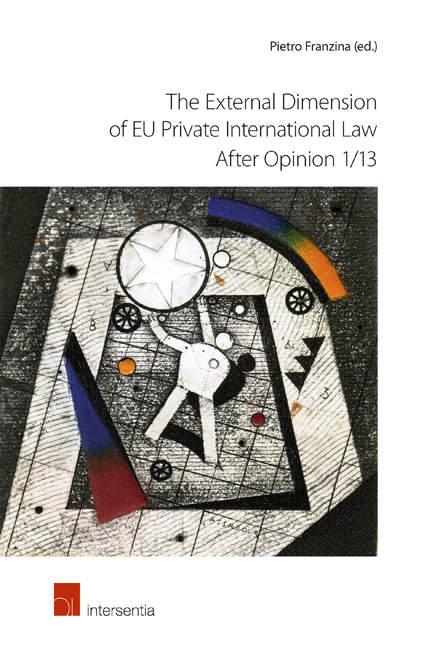Book contents
- Frontmatter
- Preface
- Contents
- PART I THE INTERNATIONAL PROJECTION OF EU PRIVATE INTERNATIONAL LAW - SOME BASIC ISSUES
- Opinions 1/13 and 2/13 and EU External Relations Law
- Between Mutual Trust and Respect for Fundamental Rights - Judicial Cooperation in Civil Matters and the European Convention on Human Rights After Opinion 2/13
- PART II OPINION 1/13 AND ITS IMPLICATIONS
- PART III THE CHANGING FEATURES OF EU EXTERNAL RELATIONS IN THE AREA OF PRIVATE INTERNATIONAL LAW
- PART IV EU LEGISLATION ON PRIVATE INTERNATIONAL LAW AND EXTRA-EUROPEAN SITUATIONS
Opinions 1/13 and 2/13 and EU External Relations Law
from PART I - THE INTERNATIONAL PROJECTION OF EU PRIVATE INTERNATIONAL LAW - SOME BASIC ISSUES
Published online by Cambridge University Press: 15 December 2017
- Frontmatter
- Preface
- Contents
- PART I THE INTERNATIONAL PROJECTION OF EU PRIVATE INTERNATIONAL LAW - SOME BASIC ISSUES
- Opinions 1/13 and 2/13 and EU External Relations Law
- Between Mutual Trust and Respect for Fundamental Rights - Judicial Cooperation in Civil Matters and the European Convention on Human Rights After Opinion 2/13
- PART II OPINION 1/13 AND ITS IMPLICATIONS
- PART III THE CHANGING FEATURES OF EU EXTERNAL RELATIONS IN THE AREA OF PRIVATE INTERNATIONAL LAW
- PART IV EU LEGISLATION ON PRIVATE INTERNATIONAL LAW AND EXTRA-EUROPEAN SITUATIONS
Summary
INTRODUCTION: TWO SIGNIFICANT OPINIONS
Towards the end of 2014 two Opinions of the Court of Justice were handed down which have significant implications for EU external relations law: Opinion 1/13 on the 1980 Hague Convention on the civil aspects of international child abduction, and Opinion 2/13 on the accession of the European Union to the European Convention on Human Rights. Opinion 1/13 sheds light on the increasingly important role played by the EU externally in the field of private international law, against a background in which the Member States have historically taken the lead. It also, at a more technical level, is one of a series of judgments in which the Court of Justice is exploring the implications of the Lisbon Treaty for EU external relations. Opinion 2/13 has been regarded as a landmark judgment, one which will have profound implications for the development of the EU's legal order and its relationship with international law, at least as if not more important than the judgment in Kadi. This short chapter cannot of course explore all the dimensions of Opinion 2/13; its main aim is to put Opinion 1/13 into the broader context of EU external relations law and to touch upon those aspects of Opinion 2/13 which link to this broader picture.
The two Opinions were delivered by the Court in response to requests under Article 218(11) TFEU, which gives the Court jurisdiction to deliver an opinion as to whether an ‘envisaged agreement’ is compatible with the EU Treaties. Despite being called an ‘opinion’ the Court's ruling under this procedure is certainly not simply advisory; in the case of an adverse opinion then either the envisaged agreement or the Treaties must be amended to remove the incompatibility before the agreement can enter into force for the Union. The objective is to forestall the legal and diplomatic difficulties that would arise if after its conclusion an international treaty were found to conflict with EU law.
- Type
- Chapter
- Information
- Publisher: IntersentiaPrint publication year: 2016



